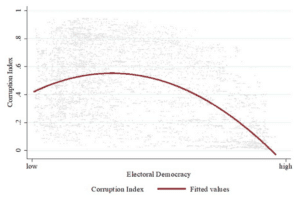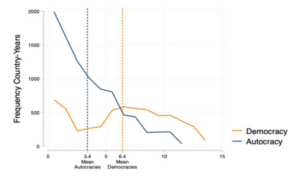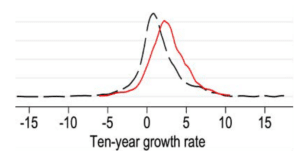Under the project “The Case for Democracy” V-Dem, an independent research institute at the University of Gothenburg in Sweden, published eight policy briefs between May 2021 and January 2022 outlining how democracies perform better than autocratic governments in the fields of public goods provision, data quality, education, economy, social protection and cohesion, health, peace and security and finally, climate change mitigation. Best known for its annual reports on the state of democracy across the world, the institute identifies scientific evidence in these papers that leaves little room for discussion.
Improvement of public goods provision
From water access to internet connection, democracy significantly improves access to public goods while at the same time reduces corruption remarkably. Scientific evidence is clear on why democracies perform better at this: when governments need to gain the support of a majority of citizens, this requires them to invest in public services. Democratic elections are a stimulus for public spending. It was observed that a transition from a dictatorship to a full democracy can increase government expenditure up to 100%. In addition, a correlation between low levels of corruption and democratic governance has been proven by empirical studies. As democratic freedoms solidify, corruption levels decline albeit there might be an initial increase in the transition period. → See policy brief #33.

More transparent and higher-quality data
Not only do democracies supply more data than autocracies, they also supply more transparent data. Autocratic regimes intentionally control the quantity and quality of data and limit freedom of expression for this purpose. Among other things, they do this to manipulate the public image of their leadership so they look more powerful and successful, for instance by inflating the level of economic growth in their reports. It was also observed that autocratic regimes have obscured and under reported the numbers of COVID-19 related deaths which occurred in their countries. Official data provided by autocracies should be approached with suspicion as they are likely to project false information. Transparency and access to information are essential components for good governance. Only in a democratic setting citizens have a right and opportunity to know the actual status of their country and government. → See policy brief #34.
Dividends for education
Not surprisingly, education levels are higher in democratic countries and democracy can increase secondary education enrollment by almost 70%. As democracies spend more on education, dividends have benefits on low and middle-income families and rural sections of the society. Yet, while it is evident that education levels are higher under democratic government, it is less clear whether the quality of education is more advanced. → See policy brief #35.

Economic growth, stability, and work for the poor
Studies show that democracy leads to economic growth. Except for a brief standstill in the period of 1900-1939, the average GDP per capita has been higher in democracies compared to autocracies from 1800 until this day. Moreover, regimes that democratized experienced approximately a 20% increase in their GDP per capita within the first 25 years of their transition. Not only do democracies experience higher growth rates, they also lead to stable and predictable growth. The argument that autocracies are better at development by giving the examples of China, Rwanda and Singapore is simply misleading. Scientific evidence shows that for the vast majority of countries, democracies do perform better in terms of economic growth. While autocracies can also experience economic growth, they also suffer more from economic crises and are more prone to negative growth. → See policy brief #27.

Social protection of the poor, gender equality and social cohesion
Democracy increases social protection and leads to higher levels of gender equality. It also increases social cohesion and advances cooperation for the common good in society. Various studies show that democratic governments spend more on social protection policies. Social welfare programs in return facilitate human development and economic growth while benefiting the vulnerable section of a society. This is supported by the argument that accountability mechanisms put pressures on politicians to invest more in public services. Lastly, empirical results indicate that gender equality is more embedded in democratic societies than in autocracies. Compared to democratic regimes, autocracies perform 60% lower in terms of egalitarian gender attitudes. → See policy brief #28.
Increase of global health
While democracy increases life expectancy, autocracy decreases health care coverage. A remarkable study published in 2019 shows that democracies can increase overall life expectancy by 3% within the first ten years of a country’s transition. This positive effect of democracy on human health is driven by elections and the duration of democratic governance in a country. This is because established democracies invest more on healthcare and hence improve the quality of the healthcare system. Moreover, empirical studies show that democracy has proven to reduce infant mortality. Lastly, it is observed that autocratic states provide lower levels of health care and hence decrease life expectancy. In light of these studies and the global wave of democratic backsliding, the quality of healthcare worldwide is something to worry about. → See policy brief #29.
International and domestic peace and security
Evidence shows that while democratic countries do not fight wars with each other, they are also less likely to experience civil war. Geographical context is also relevant. Studies demonstrate that when two countries are located in a region with low levels of democracy, the likelihood of having an armed conflict increases by 70% compared to a pair of states placed in an area with high levels of democracy. It is also important to note that democracy leads to civil peace by facilitating female empowerment. Empirical studies prove a clear relation between female political empowerment and peace. → See policy brief #30.
Combating climate change
Finally, democracy is good for setting climate goals, taking action and putting pressure on governments to tackle climate change. Evidence shows that a 10% increase in V-Dem’s democracy assessment correlates with an overall 3% increase in target ambitions according to the Paris Agreement. In addition to that, civil society groups and organizations enjoy more freedom in democracies, resulting in increased public pressure on the government and corporations to implement more effective climate policies. → See policy brief #31.
Conclusion
All the eight cases above are supported by a significant number of empirical results identified in the policy briefs. It is evident that democracy is key for a more just, peaceful and sustainable world. In this context, the global authoritarian wave is worrisome and needs to be confronted. Democratic institutions and a vibrant civil society are needed more than ever. In view of global challenges like climate change, a global democratic consolidation is essential.
In late 2021, V-Dem hosted “The Case for Democracy” conference in Brussels to discuss the policy briefs. A report on the proceedings is available here.





